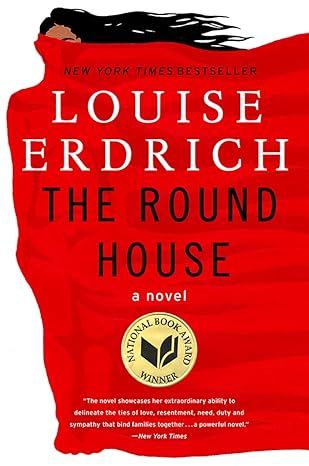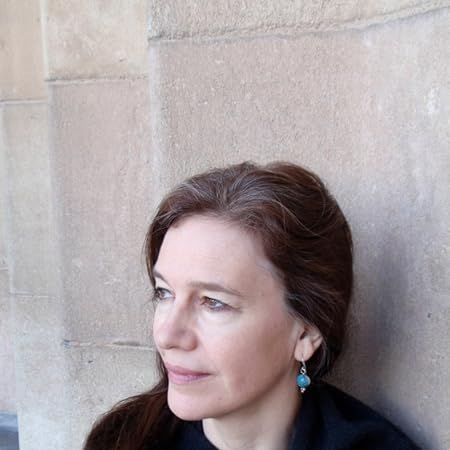The Round House: A Novel
4.3 out of 5
12,057 global ratings
One of The Atlantic’s Great American Novels
Winner of the National Book Award • Washington Post Best Book of the Year • A New York Times Notable Book
From one of the most revered novelists of our time, an exquisitely told story of a boy on the cusp of manhood who seeks justice and understanding in the wake of a terrible crime that upends and forever transforms his family.
One Sunday in the spring of 1988, a woman living on a reservation in North Dakota is attacked. The details of the crime are slow to surface because Geraldine Coutts is traumatized and reluctant to relive or reveal what happened, either to the police or to her husband, Bazil, and thirteen-year-old son, Joe. In one day, Joe's life is irrevocably transformed. He tries to heal his mother, but she will not leave her bed and slips into an abyss of solitude. Increasingly alone, Joe finds himself thrust prematurely into an adult world for which he is ill prepared.
While his father, a tribal judge, endeavors to wrest justice from a situation that defies his efforts, Joe becomes frustrated with the official investigation and sets out with his trusted friends, Cappy, Zack, and Angus, to get some answers of his own. Their quest takes them first to the Round House, a sacred space and place of worship for the Ojibwe. And this is only the beginning.
The Round House is a page-turning masterpiece—at once a powerful coming-of-age story, a mystery, and a tender, moving novel of family, history, and culture.
336 pages,
Kindle
Audiobook
Hardcover
Paperback
Audio CD
First published September 23, 2013
ISBN 9780062065254
About the authors
Louise Erdrich
Louise Erdrich is one of the most gifted, prolific, and challenging of American novelists. Her fiction reflects aspects of her mixed heritage: German through her father, and French and Ojibwa through her mother. She is the author of many novels, the first of which, Love Medicine, won the National Book Critics Circle Award and the last of which, The Round House, won the National Book Award for Fiction in 2012. She lives in Minnesota.
Read more
Reviews
Mary Jane Koch
5
American Founder Aggressive
Reviewed in the United States on August 14, 2024
Verified Purchase
The writer brought me right into the characters stories. The Priest played an amusing teenage side. The main character families grief was heart felt. You got the sense of res community. But at the same time not. And as the main Character challenges his father “why do you do this?” I loved his father’s answer. I can say more but don’t want to give away. An excellent read!
Read more
Mary Whipple
5
"My father read local history, `and the white man appeared and drove them down into the earth'...an observation of the truth."
Reviewed in the United States on November 9, 2012
Verified Purchase
Author Louise Erdrich, a member of the Chippewa (Ojibwa) nation, here writes one of her most powerful and emotionally involving novels. Though it starts as a crime story on the reservation, it quickly becomes an intense search for justice on all levels. It is also an examination of the lives of her characters, both old and young, as they face the challenges of reservation life. Their lives, as she shows in this novel, are seriously restricted by 1988, when this novel's action takes place, and any Native American who wants to honor the "old ways" on the reservation must now survive on infertile lands which cannot support him. Their culture has been seriously compromised by the arrival of Catholic missionaries who have weaned them away from their myths and traditions. Significantly, legal jurisdiction over crimes involving Native Americans now involves tribal officials, state police, and even the FBI.
In a powerful opening scene, filled with symbols and portents, thirteen-year-old Antone Basil Coutts (Joe), only child and namesake of Judge Coutts and his wife Geraldine, is helping his father to pull tiny seedlings from cracks in the foundation of their house, awaiting Geraldine's return from her office. When she finally arrives at home, she is almost unrecognizable, so badly beaten she can hardly see, reeking of gasoline and so traumatized by rape and other crimes that she has become mute. Young Joe knows that it will be up to him and his father to identify who has done this. They begin to study his father's old cases searching clues.
Joe is still a child, however, and though his empathetic father wants to protect him as much as possible, Joe becomes obsessed with getting his mother "back," determined to find and punish the rapist on his own. These tensions add drama and meaning to the novel, and Joe's contacts with others, both in his family and outside it, expand the scope. The sweat lodge ceremony is described, the extortion of elderly Indians by a white-owned supermarket on Indian land is detailed, the raucous and sexy (and hilarious) talk of elderly family members is recorded, the "flirting" of a stripper living with Joe's uncle is tension-filled and emotional, the appearance of ghosts to Joe, and the efforts of a local priest, a former soldier injured in Lebanon in 1983, are all described to powerful effect, keeping the interest and involvement of the reader at high pitch.
As in her other novels, Erdrich provides a sense of continuity by including characters from other books in this one - including the priestly Nanapush (from Tracks), who was an inspiration to Mooshum, thought now to be one hundred six years old in this novel. Mooshum, whose story is told here, was also a main character in The Plague of Doves, a book which also includes Judge Antone Basil Coutts, father of this novel's main character Joe, and Corwin Peace, father of Joe's friend Zach. By repeating these characters through successive generations, Erdrich provides a genealogy and sense of history which add to the sense of time and place, and highlight the changes, not all of them good, taking place within the community. The novel, one of Erdrich's best, will keep serious readers totally engaged with its sensitive descriptions and insights, even as those interested in just a "good story" will celebrate the action, excitement, and the issues it raises.
Read more
132 people found this helpful
Amazon Customer
5
A great story
Reviewed in the United States on June 26, 2024
Verified Purchase
Easy to read a good writer to follow
Jono Walker
5
Crime and Punishment on the Reservation
Reviewed in the United States on December 3, 2012
Verified Purchase
On the surface The Round House is a wild-West sized crime thriller that takes place on an American Indian reservation somewhere in the Dakotas. Moving with the hero as he struggles to discover the evil perpetrator and attain a just (or unjust?) resolution to the heinous crime, gives the reader plenty of reasons to keep the pages turning. But below all the highly charged surface drama, there's a warm and affecting 13 year old boy's coming of age story told as a flashback by his grown self. And below that, it's a story about modern Native American culture, its rich heritage (warts and all), the systemic bigotry and poverty Native Americans still face and the raw deals from a government that continues to stack its cards against the people who got here first.
The particular raw deal that turns out to be central to the plot derives from the law - still largely intact - preventing Native Americans from prosecuting crimes against white people when those crimes -including violent ones - are committed on reservation land. While this injustice is what drives the action forward, it is not really what the book is all about. At its core, The Round House is about many other important things. It's about the difficulty of making clear moral choices in a foggy world. It's about the instinctual and abiding love a boy feels towards his mother. It's about a boy learning - and yearning - to be on equal footing with his father. It is a book about these eternal human fundamentals; the basic stuff that applies to all of us, whether we grew up on an impoverished Indian reservation or in a comfortable homogenized suburb.
Louise Erdrich has a talent for storytelling that engages and resonates on many levels. The Round House set my brain racing to find answers, my heart aching with empathy, and my muscles twitching for revenge. While this novel echoes Dostoyevsky's Crime and Punishment, it reads more like a William Faulkner novel set in his mythical Yoknapataphwa County. It's a story more revealed than told straight out. Erdrich makes you work a little to get to the bottom of the mystery. She knows that when telling a story with so many dark and tragic elements, it's good to throw in a couple of hearty laughs for balance. And like so many Faulkner novels, there's a wonderful dynamic created between a young boy, a wise and outside-educated father figure, and the compelling passions served up by the place and situation they are both struggling to come to terms with. These and other richly delineated characters move about not in an actual place but in a representational place. I think this is what helps to imbue the novel - in spite of its gripping plot that in many ways could only have happened in this particular place at this particular point in time - with such a haunting timeless quality.
I really loved this book and am so glad to have discovered its author. According to reviews I've read by other critics, The Round House may have just won the 2012 National Book Award, but it's not necessarily Erdrich's best work. Acting upon this piece of intelligence, I have placed one of her earlier books, The Plague of Doves, high in my queue of books to read in 2013. This one is set on the same reservation and it looks like there's much to learn about the characters I have just met. I can't wait to get to their stories!
Read more
4 people found this helpful
Anthony C Johnson
5
Great author Great book
Reviewed in the United States on June 9, 2024
Verified Purchase
My Granddaughter read this book for aa course she took for a Masters Degree and recommended it to me. I have previously read "The Night Watchman" by Louise Erdrich and recommend that bok as well.
Jean
5
The reasons you should read this book
Reviewed in the United States on March 27, 2013
Verified Purchase
I have been reading Louise Erdrich's novels since The Beet Queen days, and I never thought I'd swoon over her work like I did in my youth, a time when art seemed to have more power to pierce my armor. The Round House has changed all that. I am born again. You can read the other reviews for a plot summary, (watch out for the spoilers.) I'd rather outline why you should read this book so you too enjoy this exquisite transcendence:
-
Her prose. It is gorgeous, powerful, and razor-sharp efficient. She can express in one phrase what the long-winded writers prattle on for paragraphs about. Example: "Thinking about Sonja was like punching a bruise." Enough said.
-
The characters. As always, there is a large, colorful cast, many who we've met before, and most likely will again in future novels. I love this about her work, each book you read enriches all that came before it. Every book she's written could be combined into one massive opus, and the characters and story lines would all match up. But each novel, amazingly, stands alone just as well. Even the most minor characters are fully realized, like the ex-marine priest, the town drunk, the best friend's father. Erdrich makes them all inhabit the imagination without overwhelming the reader. The book is only 300 pages long, but there are 10 or 12 characters you will never forget.
-
The story. Unlike many of her other novels, this one follows a well defined narrative from start to finish, and has a clear and supported theme (about Indian law), making it more of a page-turner and thus more appealing to a wider audience. Read the first chapter. As is her custom, it opens with a bang. I have never read an opening to an Erdrich novel that did not floor me. But this time, the story builds from that opening chapter in a straight and increasingly compelling line. Most of her earlier works weave and meander in time and place, perhaps more complex than this novel, perhaps just less disciplined. And also unlike earlier novels, this one is told in the first person, a single voice, that of Joe Coutts, a lawyer recounting the events of the year he was 13. Perhaps this was done to avoid distracting the reader from the theme. Erdrich seems to have more invested in her agendas of late, like me maybe, becoming more political as she ages.
-
The humor. Although centered around a brutal rape and horrible injustice, the story is not trapped in that über serious and tragic melodrama we are used to in lesser novels with similar agendas. There is plenty of heartbreak, but also passages that had me laughing out loud. Wait till you meet the dirty-minded Grandma Thunder. If there wasn't so much else going on in Erdrich's novels, we would hear them described as funny more often. Her sense of humor is ever present, but somehow, does not detract from the gravity of the message.
-
The mysticism. I am the type who rolls my eyes at the chakra-healing, aura-reading new-agey types, but when Erdrich writes about singing fish, buffalo who speak to you in dreams, and ghosts who emerge from the dark woods with messages for the living, I believe. It's as if I'm under a spell as I read. That is the power of her writing. And it feels good, to be released from my cynical, rational, over-thinking mind for a while.
If this is your first Erdrich novel, I recommend following up with Plague of Doves. This one takes place about 20 years before The Round House, with many of the same characters. To fully immerse yourself in her astonishing talent, read 3 of her much earlier works, The Beet Queen, Love Medicine, and Tracks. Those books had a such a profound emotional impact on me that I still get goosebumps after over 20 years.
Read more
13 people found this helpful
Desert Mambo
4
Character driven literary fiction that asks some hard questions
Reviewed in the United States on December 19, 2012
Verified Purchase
First, I'd like to address some of the negative reviews by pointing out what seems obvious to me (but apparently is not to some disgruntled readers): this is a work of literary fiction. It is not a "mystery" (though it has some elements of suspense) and it is not a thriller, and it is not meant to be a fast read you can skim over and forget. It is a literary novel, and yes, it focuses on reservation life in a certain time and place. If you are a reader who does not want to read about some of the hard realities of life, or a reader who is not interested in, or perhaps even offended by, portrayals of white racism, you'll want to skip this book. You may also want to skip this if you have zero tolerance for the mythical, though this book has less of the mythical and folkloric elements than some of her other books.
Now other fans of Erdrich, like me, and other readers of literary fiction, I can get on with the rest of the review.
For me this is a beautiful book, well worth reading, though not her finest. I reserve that for my two favorites--Tracks and Love Medicine. Still, this book is compelling, well written, and it kept me thinking about it days after I read it.
Yes the story does contain a "mystery" to be solved, and that part--the slow discovery of who committed this awful crime--does pull a reader through the story. The point, though, isn't to rush through and guess. The point is to think about these characters and their lives. I thought Erdrich captured a certain time very well, and unfortunately, I recognized too well the casual racism expressed in parts (the white woman who suggests that Native people should go to "their own" hospital, for example). I'm not sure those things are all changed, unfortunately, but the prejudice expressed seemed typical of the uneasy relationships between Native people and white people that I found particularly accurate of the 80s/90's and earlier. And of course, the violence many Native women experience, and the ways in which there is a lack of will to even attempt to find justice, is still, unfortunately, heartrendingly true. For me, this book was painful to read--it so accurately portrayed--but also powerful. This truth is important--stories like this need to be told.
And one of Erdrich's gifts as a writer has always been to be able to tell hard truths, but make them palatable to a wide variety of readers. She does this with her brilliant characterization, and her gift for the comic and unexpected. There are plenty of light moments in this book, from the boy's discussion of Star Trek: The Next Generation, to the birthday party for an elder that goes wrong, to the ribald humor of a raunchy old grandmother. It is these things that lighten up a book that overall, is a very depressing tale indeed.
It is character, in fact, that drives this novel, and the decisions of the young narrator are particularly interesting and compelling. Though this has been touted as a "coming of age" novel, it is only that in that shares the "loss of innocence" theme with that genre. Here is a boy, a good boy, who we get to know in the beginning as he is actually enjoying weeding with his father, who is suddenly thrust into a particularly ugly world. How he struggles with some very difficult situations, and how he makes mistakes, is one of the most beautiful things about this book. There are also several other more minor characters that are really well drawn (so much so, in fact, that they almost take over in places). There is a fascinating priest, and an ex-stripper, and for fans of Erdrich's other books, Nanapush (one of my favorite characters) also makes an appearance.
This is also a book that meditates on the nature of evil. What causes people to do evil? There is a side story about the Windigo which is fascinating, and asks the question about evil and how to deal with evil-doers. This is a particularly compelling question in the times we live in, and of course, Erdrich, like any wise person, has no real answers, only a lot of questions. It is this part of the book that kept me thinking long after I'd finished the book.
This is not to say that this book is flawless, which is why I did not give it 5 stars. While I love the character development, I thought that there were times that the characters and situations got away with her, and it seemed indulgent. The birthday party scene, as other noted was one of the places I felt like could have been trimmed, and some of the moments of the young boys discussions also were engaging but could have been trimmed to make the book tighter. But I'm also not a fan of her more "comic" novels, so perhaps that is just my taste as a reader.
Overall, though a great, thought provoking read!
Read more
27 people found this helpful
RockyGirl
4
Well Written
Reviewed in the United States on June 14, 2024
Verified Purchase
Our book club choice. I had trouble slogging through the Gooshun stories, but other than that it was intriguing and enlightening too, regarding indigenous laws, customs, language and their sad history with our government.
Larry Hoffer
4
A powerful story of family, friendship, and the loss of innocence...
Reviewed in the United States on November 21, 2012
Verified Purchase
I'd rate this 4.5 stars if I could...
There comes a traumatic time in a child's life when they realize their parents, whom they've idealized (even idolized), are fallible and flawed, just like everyone else. It's difficult to come to that realization, which sometimes creates ripples that play out for their entire lives.
For 13-year-old Joe Coutts, who lives on a reservation in North Dakota in 1988, that moment comes shortly after his mother, Geraldine, is sexually assaulted one Sunday. She is both physically and emotionally traumatized, and nothing that Joe or his father, Bazil, a tribal judge, can do can help heal Geraldine or assuage the anguish she feels. And although she still fears her attacker, she is reluctant to share the details of her assault and what led to it, and would rather that Bazil and Joe drop the subject.
As Bazil tries to care for Geraldine and keep as much normalcy at home as possible, he tries to determine who is responsible for his wife's assault, keeping within the confines of tribal law. Joe begins learning more about the justice system and possible perpetrators, and wants his father to keep him fully involved in the investigation, which leads him to pursue his own suspicions.
With all that is going on, Joe finds himself on the cusp of adulthood quicker than he planned. He enlists his best friends, Cappy, Zack, and Angus, to help him with investigating some of the people who might have been responsible for his mother's attack, a task they take on in earnest when they're not drinking, smoking, talking about girls, and acting like typical teenagers. And when the person responsible for assaulting his mother winds up walking free, Joe faces a difficult dilemma about how to take control of the situation and restore normalcy to his family's life, no matter what the cost.
The Round House, which recently won the National Book Award, is a powerful story about the bonds of family, the loyalty of friendship, the loss of innocence when you encounter violence for the first time, traditions, and the pain and excitement of growing up. Louise Erdrich created beautifully complex and vivid characters, and unfurled a multi-layered plot that kept me reading even as I had suspicions about how it would progress. As she often does in her books, Erdrich also included Native American elements into the story, through the character of Joe's grandfather, Mooshum, and the traditions of the sweat lodge and the round house.
This is a beautifully written, compelling, and thought provoking book, one in which I felt deeply invested. I did think the story moved a little slower than I wanted, and as much as I enjoyed Mooshum's stories, sometimes they ran a bit long, and then they were more of a distraction. But on the whole, this is a book that packs a powerful punch, one that will keep you thinking about it long after you're finished.
Read more
Book Club Mom
3
The Round House is a mix of styles
Reviewed in the United States on January 12, 2014
Verified Purchase
I'm giving The Round House three stars because, although I enjoyed reading it, I wasn't completely satisfied with the direction it took. To be fair, I liked many things about this story of the Coutts family, Native Americans living on an Ojibwe reservation in North Dakota. Thirteen-year-old Joe Coutts is in that middle space between boyhood and adulthood and feels driven to find and punish the man who has attacked, raped and nearly killed his mother, Geraldine. After this plot is developed, however, the book takes several detours that do not always blend well with the storyline. The author begins by describing how Geraldine, Joe and his father, Bazil, cope in the aftermath of this violent crime. Amid their shock and outrage is their desperate wish to have things back to the way they were. When Geraldine retreats to her bedroom, they struggle to coax her back into their lives. The question of jurisdiction is equally important and Bazil, an Ojibwe judge, turns to his law files to find an answer. The exact location of the crime is critical, and because of overlapping land rights, Bazil understands that it's unclear who will decide the case, the Ojibwe court system or the federal courts. These are the things that drew me in.
Instead of this focus, however, the plot seems to meander and visit storylines and characters that go nowhere or are bumbling and comic and I think this is strangely out of place. Bazil hauls files home from his office and he and Joe begin their research, but this effort seems to stall. Joe and his buddies visit the crime scene to locate evidence and are easily sidetracked. They make other efforts to gather evidence in an almost slapstick fashion. At other points, Joe's narration seems to take on the style of a "Whodunit" crime novel.
But here are the main things I liked about The Round House:
Erdrich tells a moving story about family relationships. I like how all the characters recognize the importance of family and are accepting of friends of family and also across a wide range of families. I like how this bond spans all generations.
I enjoyed learning about the Ojibwe traditions and beliefs.
I think the "early" Joe character is well-defined. I especially like how Erdrich describes him as he wishes he could have gone back in time to prevent his mother from leaving on the day of the attack because this is such a human way to think. "I kept thinking how easily I could have gotten in the car with her that afternoon. How I could have offered to do that errand. I had entered that furrow of remorse - planted with the seeds of resentment - peculiar to young men."
I think Linda Wishkob is Erdrich's best character. Her story and how it ties in with Joe's family is the most interesting. Her reactions are unpredictable and that adds a lot of suspense. And although she is a strange and quirky sort, this character works.
Bugger Pourier's character is a nice "sleeper" addition. I like how he seems to be unimportant, but has important information.
Bazil's dinnertime stories, designed to draw Geraldine out of her depression, are touching. I like how hard Bazil tries to bring her back.
I think Erdrich does a great job showing Joe's feelings of dread and sickness near the end of the story, as he realizes what he has done.
Joe's friendship with Cappy. I like how Erdrich describes these friends. I especially like when Cappy trades sneakers with Joe, even though they wear different sizes. I think this is a realistic example of friendship between guys.
I've mentioned some of the things that bothered me; however I have a few more:
Father Travis - I think this character is totally unrealistic and I don't know how it adds to the story, except perhaps in the end, when he helps Joe understand how good can come from bad things. "The only thing that God can do, and does all of the time, is to draw good from any evil situation." I'm also not sure I understand Travis' recollection of the JFK assassination or its relevance. In addition, the chase scene between Cappy and Father Travis is a head-scratcher.
Joe's character takes on drastic changes and they seem unrealistic for a thirteen-year-old boy. How is it these boys are driving cars?
Sonja's character. I guess she's supposed to be someone Joe feels conflicted love for, but I don't understand how the reader can be sympathetic to her situation and forgive her actions. I think she has the potential to tie together the theme of violence against women. I wish Erdrich had done more of that.
I think Joe's grandfather, Mooshum, is a character with great potential and his sleep-talking fables are interesting to me. I wish they had been tied better to the main plot.
Sonja's birthday visit to Mooshum. No spoilers here, but beyond strange.
Other references to Star Trek, Star Wars. This is lost on the readers who aren't into these shows and movies.
Mooshum's birthday cake. I like the description of the party and how it shows the warmth of the celebration, but I don't understand the incident. Is this supposed to be funny?
A couple Kindle typos. Not a huge deal, but still...
I think a lot of this is a matter of opinion and reader taste, however, and I welcome other points of view. I've read reviews that complain about the lack of quotation marks. Didn't bother me. I've read other reviews that compare The Round House to To Kill a Mockingbird. I don't think this is a fair comparison, despite the similar initial premise. I'd love to hear what you think. I'd also like to read something else by Erdrich and I'm looking for recommendations.
Read more
14 people found this helpful
Top Louise Erdrich titles
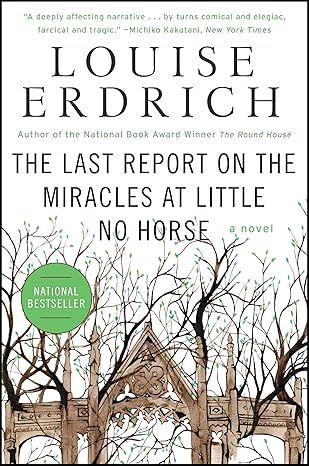
The Last Report on the Miracles at Little No Horse: A Novel (P.S.)
4.5
-
1,390
$1.51
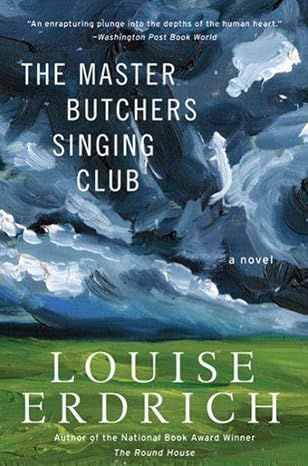
The Master Butchers Singing Club: A Novel
4.3
-
1,437
$1.96
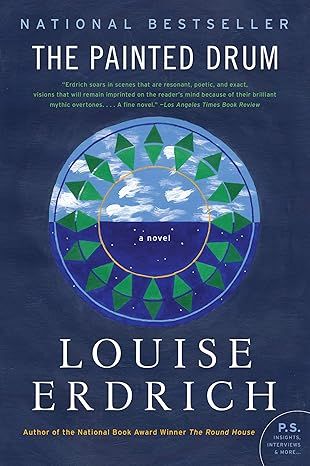
The Painted Drum: A Novel (P.S.)
4.4
-
963
$1.74
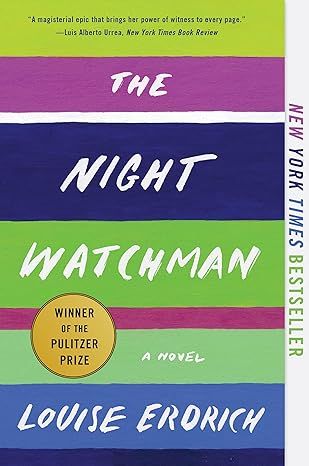
The Night Watchman: A Novel
4.4
-
21,822
$9.00
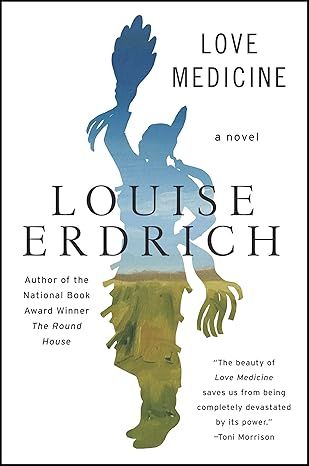
Love Medicine: Newly Revised Edition (P.S.)
4.3
-
1,019
$11.99
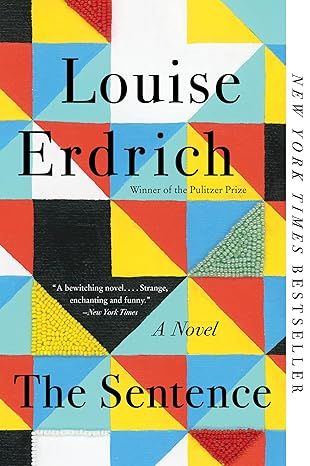
The Sentence: A Novel
4.3
-
8,450
$2.99
Best Sellers

The Tuscan Child
4.2
-
100,022
$8.39

The Thursday Murder Club: A Novel (A Thursday Murder Club Mystery)
4.3
-
155,575
$6.33

Sapiens: A Brief History of Humankind
4.6
-
140,302
$13.49

The Butterfly Garden (The Collector, 1)
4.3
-
88,556
$9.59

Things We Hide from the Light (Knockemout Series, 2)
4.4
-
94,890
$11.66

The Last Thing He Told Me: A Novel
4.3
-
154,085
$2.99

The Perfect Marriage: A Completely Gripping Psychological Suspense
4.3
-
143,196
$9.47

The Coworker
4.1
-
80,003
$13.48

First Lie Wins: A Novel (Random House Large Print)
4.3
-
54,062
$14.99

Mile High (Windy City Series Book 1)
4.4
-
59,745
$16.19

Layla
4.2
-
107,613
$8.99

The Locked Door
4.4
-
94,673
$8.53
